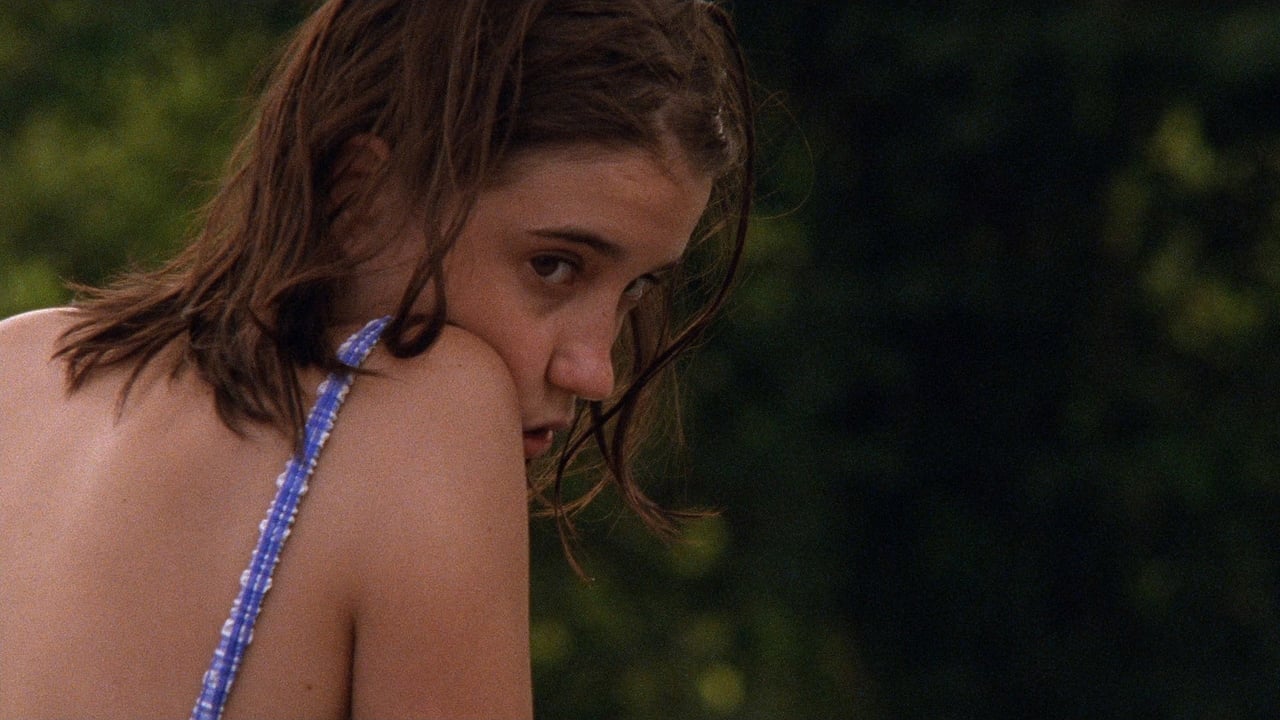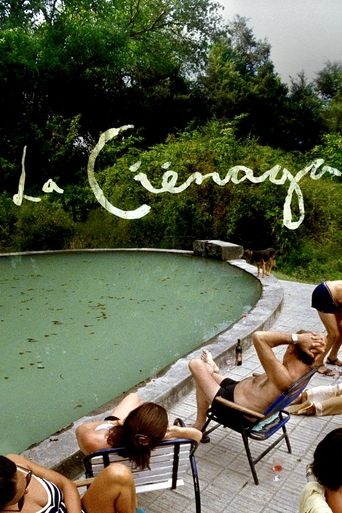

Overrated
... View Moreone of my absolute favorites!
... View MoreOk... Let's be honest. It cannot be the best movie but is quite enjoyable. The movie has the potential to develop a great plot for future movies
... View MoreYes, absolutely, there is fun to be had, as well as many, many things to go boom, all amid an atmospheric urban jungle.
... View MoreShot in Salta, director Lucrecia Martel's hometown, nestled in the Argentinian high plains, her debut feature THE SWAMP is a cinematic homage to the place and milieu where she grows up, it is intimate, clammy, misty and torpidity-ridden, an internalized sociological drama that definitely puts her name on the cinematic map. Two households' quotidian lives are interlocked together, Mecha (Borges) is the matriarch of a petit bourgeois family, husband Gregorio (Adjemián), two teenage daughters Verónica (Balcarce) and Momi (Bertolotto) and a younger son Joaquín (Baenas) who has lost his right eye and pending for an operation. Most of them vegetate around in their decrepit countryside estate under the influence of the humid and sweltering weather, a sanguineous accident brings back her eldest son José (Bordeu) for a sojourn and the visits from her working-class cousin Tali (Morán), who is living in the town with her husband Rafael (Valenzuela) and a brood of 4 (or 5?) younger kids, a prominent feature sees Martel unfolds the story in medias res and leaves no explanatory pointers, therefore it is completely left to viewers to piece together the make-ups of the two families (and other backstories) through its meandering and characteristically rowdy narrative, a task this reviewer might not able to cinch in the end.Kit her camera with a slithering but sensibly unobtrusive mobility, Martel unwaveringly levels it to her close-knit characters with clinical observation, often from unorthodox angles, no establishing shots, seldom focuses on the exterior locations or utilizes long shots, the camera is restive but the characters are entrapped and enervated inside their pokey space, mostly on their beds, lazing around, doing nothing, their stalemate is contagious, a metaphor blandly illustrated by a buffalo bogged down helplessly inside a swamp. Day-to-day triviality is given a microscopic examination under Martel's perceptive, score-free orchestration, through which she deftly lays out the chasm between classes and races (Mecha vs. her Amerindian servants), latent lesbianism (Momi's obsession with the young maid Isabel, played by a stolid Andrea López), the connubial strain and sheer contempt, religious sideswipe (through faux-newsreel of Virgin Mary's alleged manifestation) and the quasi-incestuous horseplay between José and Véronica, and pertaining to Martel's female slant, it is him in the state of dishabille for viewers to gaze upon, all integrated organically into this understated but telling drama that excoriates Argentina's pandemic ennui, to the point when its detriment start to tell in the accidental (but presaged) tragedy which brings down the final curtain, it hits less like a wake-up call than the designed vagaries of kismet, a very fine stepping stone from a robust film-maker making a good fist of counterpoising the inexplicable with the pedestrian.
... View MoreThe story of Mecha (Graciela Borges), a middle-aged woman in her 50s who has several teenagers. Her husband Gregorio (Martín Adjemián) wants to remain looking young, and both of them have to deal with their gloomy Amerindian servants, whom Mecha accuses of theft and laziness.Stephen Holden wrote, "The steamy ambiance in which the characters fester is a metaphor for creeping social decay...La Ciénaga perspires from the screen, it creates a vision of social malaise that feels paradoxically familiar and new." The best part is early on, where the clinking of glasses makes everything else soundless. What is being said about these people who do nothing all day but drink and lounge around a pool far too filthy to swim in?
... View MoreMaybe you have to be Argentinian to really appreciate this film. In the stultifying heat of a hot, humid summer, a rich (though decaying) family sit around drinking, playing with guns, exhibiting casual racism and watching television reports of the appearance of the Virgin Mary. No-one does anything useful and very little in the way of plot occurs; indeed, even when things do happen, the film refuses to treat them as plot (for example, a late scene, threatening tragedy, is never followed up). It's a pretty powerful metaphor for national decline, and if you strain, you can detect faint hints of black humour, but even so, 'La Cienaga' is pretty devoid of conventional entertainment. The acting convinces, so does the dialogue; but there's not that much to keep you watching.
... View MoreLucrecia Martel, the talented director of "La Cienaga", creates a dark picture with this film that takes place in the northern part of Argentina that borders Bolivia. Having seen "La nina santa" prior to watching this movie, there is a sort of connection between the two, as the director explores the darker side of human beings, which seems to consume her."La Cienaga" is a film that mirrored the times when it was made. The last part of the 21th century was devastating for Argentina as most people were affected by the rapid changes in the economy that befell the land. As the film starts, we suffer from disorientation. We are taken to Mecha's house in the country where a group of people are seen sitting around the swimming pool. No one says anything to one another; it's as though the oppressing heat has numbed everyone. The only thing left to do is to drink to oblivion.Mecha appears to be inebriated when she tripped and fell. The wine glass cuts her in the chest. Blood is seen all over the place. Then, as though by magic, we are taken to meet Tali and her family, who appear to live in town. There is a sharp contrast between the two households. Where Mecha's house is run down, it still shows signs of a richer past. Tali's home, on the other hand, is a much humbler place.Ms. Martel makes a subtle comment on what she shows us. There are a lot of things that are wrong in Mecha's house, like the lesbianism shown between one of her daughters and the maid. Incest is also hinted when Jose, the older son, who has come from Buenos Aires to see his mother after her accident, shows a sick interest in his beautiful sister. He enters the bathroom while she is taking a shower. At the same time, we are shown on the television set, an incident where people are attesting to seeing the Virgin Mary in a water tank on the roof of a house.The director imbues the film in symbolism, which seems to be hard for viewers to follow. The story is deeper than what the images present for our viewing. That is why this enigmatic film did not reach a wide audience. It's a shame because Lucrecia Martel's film has a hypnotic way to get us involved.Graciela Borges, an Argentine film star in her own right, plays Mecha, a woman of the moneyed society who appears to have seen better days. Ms. Borges underplays her character, achieving a great appearance. Mercedes Moran, who played Helena in "La nina santa", is seen as Lita, Mecha's cousin, Lita shows a lot of common sense. She also has a lot of problems, but she is much grounded than her cousin that is decaying in the old country estate. The ensemble cast is also good.While "La Cienaga" is a disturbing work. Lucrecia Martel wrote and directed with great style. It's worth a look of fans of the Argentine cinema because it shows one of the most original talents in a film that dares to go where others don't.
... View More